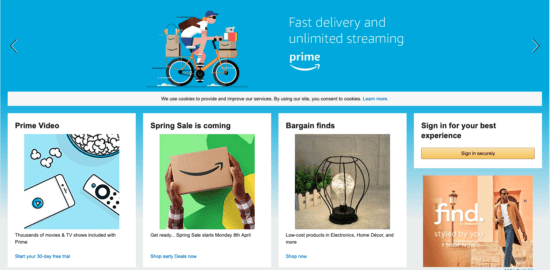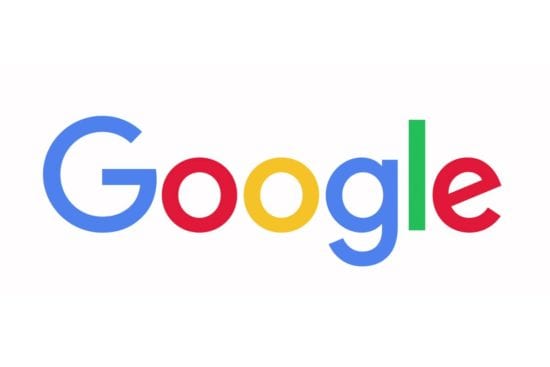Consumers don't trust influencers, Facebook launches 3 new ad tools for small businesses, Amazon storing UK biometric data, Facebook relaxes cryptocurrency ad rules, Google's new consumer privacy plans, Facebook removes "dangerous users", digital ad revenues top $1bn, Facebook political ad warning and Singapore passes 'fake news' law.
This week has seen a number of big digital and marketing stories in the headlines. We've taken a look at some of the biggest, including new findings that show only 4% trust information shared by celebrity influencers, bloggers and vloggers.
On top of this, Facebook has announced three new advertising tools that are aimed at helping small businesses make the most of the platform.
There are also concerns being raised about a new Home Office contract that could see Amazon storing biometric information belonging to millions of people in the UK.
Other Facebook news reveals that the platform is loosening its rules on advertising related to cryptocurrencies and blockchain technologies, possibly because it is looking at these for its future services.
In big news for consumers, Google has announced privacy plans that will affect user history but still hasn't made changes to third-party cookie tracking.
Facebook has also cracked down on more "dangerous users" and has removed several high profile accounts. The platform has also warned that foreign agents are managing to get around its toucher rules and regulations relating to political advertising.
Digital ad revenues have hit an all-time high, breaching the $100 billion mark in 2018, with mobile and video accounting for the largest shares.
Finally, Singapore has passed the law it tabled last month, meaning the government has more rights when it comes to dealing with false news shared online.
Get more info on each of these stories below with our Friday news roundup.
Only 4% of internet users trust information from influencers
Most people only believe around 8% of the information they see online, according to UM’s annual Wave study, but this falls to just 4% when it comes to information shared by influencers. The study tracked over 56,000 internet users in 81 countries to evaluate how much trust is placed in social media.
Only a small fraction of study respondents said that they felt like three-quarters or more of the information they see on social media is correct, meaning that most understand there is an element of “fake news” when it comes to social sharing.
While influencers have been seen as a great marketing tool by many brands, helping to raise awareness and engagement, it seems that many people are now losing trust in them. Celebrity influencers, vloggers and bloggers were even seen as less trustworthy than governments, with 12% of overall respondents saying that information from the government was “mostly truthful”.
Although these figures fell to 8% and 6% in the UK and US, respectively, it still looks as though governments are more trustworthy than celebrity influencers. This is likely due to the perceived lack of transparency over influencer posts, with many influencers getting into hot water over the last few years for failing to declare when a post is an ad or paid for.
In a bid to ensure influencers are more transparent, regulators in both the UK and US have made rules stricter, imposing punishments for those failing to declare content that is part of a brand-influencer partnership.
Social media platforms are also being urged to deal with the number of fake followers online, which are often used to boost influencer followings in order to make them look more influential.
These efforts have a long way to go, though, as the research found that just 36% of internet users in the UK trust the opinion of bloggers and vloggers when it comes to product and service opinions. On a global scale, this figure was higher but still less than half at 42%. This supports other findings that show that people are more likely to trust recommendations from friends or family members.
This isn’t the only attitude that is changing when it comes to social media. The study also revealed that fewer people are worried about missing out if they don’t visit social media. In 2017, this figure globally stood at 50% but it has now dropped to 46%. In terms of the UK, the number fell from 41% to 39%, showing that people may be getting social media fatigue.
In terms of the most popular sites that people would describe as being a “great place for someone like me”, traditional social media platforms - like Twitter, Facebook, Instagram and Snapchat - didn’t appear in the top five. Instead, Netflix took the top spot followed by YouTube and Spotify.

Facebook launches small business ad tools
Facebook has announced a range of new tools aimed at helping small businesses promote and manage their company on the social media platform. Announced in a blog post, The tools are designed to ensure small businesses are able to succeed on Facebook.
The tools were announced to mark National Small Business Week and to show that Facebook is committed to helping the 90 million small businesses on the platform to better promote themselves. There are three tools in total: new video editing, Automated Ads and appointments.
Automated Ads
This new ad format has been designed to reduce time and make it easier for businesses to produce ads. They are less complex than traditional Facebook adverts, making them ideal for those with less social media marketing experience.
Advertisers will only need to answer a few questions about their business and goals and Facebook will generate a marketing plan for them. According to Facebook, this takes “the guesswork out of creating effective ads that can run on Facebook, Instagram, Messenger, and Audience Network.”
Features of the new Automated Ads include:
- Audience suggestions: Using information from a business page, Facebook will offer tailored audience suggestions to help the ad reach the right people.
- Ad versions: The tool will allow businesses to create up to six different versions of their advert automatically. The platform will suggest creative and practical details, such as a CTA button, before showing the most successful version.
- Notifications: Businesses will receive timely notifications that let them know how the adverts are performing, as well as how they can be improved.
- Recommended budget: A budget will be recommended by Facebook that is most likely to help businesses achieve its goals. It will also estimate your results from your budget.
Appointments
Businesses will be able to book and manage appointments from both Facebook and Instagram, making it easier for customers to book in. This feature lets small businesses accept appointments online, it also means reminders can be sent to customers either by text message or Messenger.
In addition, the appointments feature will let businesses customize their “menu of service” and display what availability they have. Appointments can then be synced with a business’ personal calendar or the appointment management service they use.
The feature is free for all businesses, include the reminders service.
Video editing
Also being launched within Ads Manager is three new video editing tools. Businesses will be able to use automatic cropping, video trimming and image and text overlays to create videos that are as engaging as possible.
The tools will allow business pages to edit existing videos, reducing “the resources needed to create compelling video content.”
Facebook said of these tools: “We know small business owners are strapped for time, which is why we’re committed to building tools that save you time and enable you to focus on the parts of your business you love. Today, we’re making it easier for you to manage and promote your business across our platforms.”

Concerns raised over Amazon “storing UK biometric data”
Biometric data belonging to millions of people in the UK could be stored by Amazon as part of a Home Office contract. The £300 million contract is aimed at combining the police and immigration biometric databases, but concerns have been raised over the fact that the details of the contract have been kept secret.
The Home Office is aiming to create a “strategic and central bureau platform”, which will contain DNA, fingerprints and facial-matching information. This platform could ultimately be used by the passport office, police and law enforcement and border force staff. Ultimately, it will make it easier for biometric data to be accessed by the relevant bodies.
While the contract is still in the tendering process with no supplier having been chosen yet, The Daily Telegraph reports that bidders include DXC Technology, IBM and Leidos. It also seems as though suppliers currently bidding for the contract are being pushed toward using AWS, Amazon’s cloud business.
A spokesperson for the Home Office said that it will consider “all bids that meet the technical requirements set out in the contract and does not stipulate the use of a certain hosting provider.
“All contracts are awarded on the capability of the supplier to meet the requirements and provide value for money.”

Facebook relaxes rules around cryptocurrency advertising
Facebook is no longer going to be banning all ads related to cryptocurrencies or blockchain as it announces that it is loosening its rules around the technologies. This means that more businesses working on the two technologies will be able to promote themselves on social media.
Initially, Facebook blocked adverts on its platforms that promoted initial coin offerings and cryptocurrencies back in January 2018. This decision was fueled by the worry that social media users might be scammed by some startups. However, it went on to reduce this bane six months later in June, allowing advertisers who had prior written approval to post ads on its platforms.
Facebook is now rolling back this ban further, meaning many types of ads relating to cryptocurrencies and blockchain will no longer require approval. It is being suggested that the move is due to the fact that the platform is currently developing its own blockchain project to allow WhatsApp users to make cryptocurrency payments.
In a blog post, Facebook said of its decision: “We’ve listened to feedback and assessed the policy’s effectiveness. While we will still require people to apply to run ads promoting cryptocurrency, starting today, we will narrow this policy to no longer require pre-approval for ads related to blockchain technology, industry news, education or events related to cryptocurrency.”

Google announces new consumer privacy plans
Google has announced updates to its privacy controls that allow users better control over deleting information. At the Google I/O event in Mountain California on May 7th, Google announced its plans to improve consumer privacy.
The internet giant is set to provide users with auto-deleting controls, which will mean that app and web activity will be automatically removed. Users will be able to get rid of information after a minimum of three months without having to manually clear their history. According to Google, this will be extended to location history in the future.
While this news is great for consumers, advertisers are still left waiting for a new toolkit from Google to limit cookies on the Chrome Web browser. This possible move was initially reported on by The Wall Street Journal.
It is expected that the cookie update will allow Chrome users to see what third-party cookies are tracking them. They will also have the ability to avoid them, which will have a large effect on online advertisers.
While a number of other web browsers, including Mozilla and Safari, have taken more extensive measures to reduce and limit cookies, the fact that Chrome has such a large market share means that any update to its cookie policy will have a huge effect. Ultimately, it will increase cookie-challenged browser share to 82% from just 19%, according to LiveIntent.
Although a stricter cookie policy would answer the requests and needs of consumers, it could have a big impact on advertising. Limiting third-party cookies may provide Google a boost by reinforcing its anti-competitive advertising dominance. However, as no new toolkit has been announced, it is unclear what the impact could be.
Facebook removes “dangerous users” from platforms
Facebook is continuing its efforts to clean up its platforms by removing more “dangerous users”. The social media giant has removed more users who continuously spread malicious fake news and extremism in a bid to make the platform safer for users.
Users who have now been removed include Nation of Islam leader Louis Farrakhan, Milo Yiannopoulis, editor of Brietbart News, and the founder of InfoWars, Alex Jones. Other users who share anti-Semitic information, far-right extremism and conspiracy theories have also been removed.
In a statement confirming the removal of a number of controversial figures, Facebook said: “We’ve always banned individuals or organizations that promote or engage in violence and hate, regardless or ideology.
“The process for evaluating potential violators is extensive and it is what led us to our decision to remove these accounts today.”
The accounts that have been removed are now banned from all Facebook-owned platforms. Individuals affected were notified in advance of their removal to allow them to direct followers to other channels not owned or operated by Facebook.
Digital ad revenues reach historic high
Digital ad revenue his an all-time high in 2018, reaching $107.5 billion. A report released by the IAB and prepared by PwC found that online ad revenues grew by 22% year on year from 2017’s $88.3 billion.
Big contributors to the huge growth are mobile and video, with mobile revenue accounting for 65% of all of 2018’s digital ads and standing at $69.9 billion. Online video also saw a sizeable year on year increase of 37%, meaning that its ad revenue came to $16.3 billion. This means that digital video was the fastest growing format in 2018.
Randall Rothenberg, chief executive officer of IAB, said: “Surpassing $100 billion in annual revenue is a watershed moment for the digital advertising ecosystem - one built on its power to build direct relationships between brands and today’s consumers.
“Innovative platforms like over-the-top television, podcasts, virtual reality and augmented reality all have the potential to help marketers forge even stronger ties with audiences, as brands navigate the new ‘consumer-first’ playing field.”
Is it expected that digital ad revenue will only continue to grow, with the rollout of 5G likely to further the impact of mobile advertising.

Facebook's new political ad controls compromised
Facebook has warned that the new political advertising controls it implemented are already being bypassed by foreign agents.
The controls were implemented to make political advertising on Facebook’s platforms harder and to ensure that parties responsible for adverts of a political nature were fully documented and were not spreading fake information.
Nathaniel Gleicher, the head of Cybersecurity at Facebook, warned that these controls are being circumvented. Speaking at Facebook’s annual F8 conference, he revealed that people had been recruited to circumvent the controls to allow foreign powers to maintain a political presence in certain countries. This has meant that people have been able to break the rule that states that anyone posting political ads needs to be a resident of the country where the campaign is being run.
Mr Gleicher said at the F8 conference: “We found two separate, unconnected operations that originated in Russia and used similar tactics, creating networks of accounts to mislead others about who they were and what they were doing.”
Deceptions like this have resulted in Facebook removing 97 accounts, pages and groups based in Ukraine. These were all attempting to spread incorrect information on topics like Crimea, Syria and Russian politics. Another 21 accounts that were spreading information about Germany, the UK, Ukraine, the Baltic states and Spain were also taken down.
Singapore passes law to stop the spread of online fake news
Singapore’s ‘fake news’ law has officially been passed with an overwhelming House majority. The Protection from Online Falsehoods and Manipulation Act (POFMA) was originally tabled in April and was passed by Parliament on May 8th.
The law means that the government of Singapore has more power when it comes to the spread of fake news or ‘falsehoods’. Ministers are able to order the correction or removal of content posted online that is deemed to be false or misleading. However, there are rules in place for what the government can act on, meaning it cannot remove or ‘correct’ opinions that are not stated as facts.
Fines of up to SGD$1 million ($737,790) can be imposed on tech companies like Facebook, Google and Twitter if they are not quick enough in addressing falsehoods, either through correction or removal.
Under the new law, tech platforms will also be required to remove fake accounts that are bot-operated. They will also have to block adverts on fake news sites, having an impact on revenue.
Those who share something considered to be false on social media or via WhatsApp will not be held criminally liable. However, they will be subject to orders that mean the posts must be corrected or removed.










